Adapting Socratic Seminar: Senior Project Reflection Transcript
Card: TCH Teaching Channel
Card: Socratic Seminar: Senior Project Reflection
Card: 12th Grade English
+++ 00:00:17 +++
Johanna Paraiso: To start we’re going to have a Socratic Seminar but there’s some prep work we want to do beforehand.
Card: Johanna Paraiso, 12th Grade English Teacher, Fremont High School, Oakland, CA
Johanna Paraiso: Johanna Paraiso. Everyone calls me Jo. My students call me Ms. P. I teach 12th grade English at Fremont High in East Oakland.
+++ 00:00:32 +++
Johanna Paraiso: Now we’re gonna discuss a process. So that’s the part that might feel very different too because the content is not Shakespeare. The content is not Richard Wright. The content is what you actually did already for your senior project.
Johanna Paraiso: Today’s lessons is about the students evaluating what they learned through the senior research process this year. They were scored last week after doing presentations and they’re getting that feedback today.
+++ 00:01:00 +++
Johanna Paraiso: I want you to kind of look at our senior exhibition process and we’re going to look from psychoanalytic lens for today. With the psychoanalytic lens, you are really studying how you were you feeling. Jasmine, question one is what?
Jasmine: Based on the randomized & anonymous feedback, what were the judges looking for as evidence of success? What patterns do you notice?
+++ 00:01:19 +++
Johanna Paraiso: I clarify what the seminar questions are and in this case, what is it that the judges were looking for? What did you learn from the process? Is it a valuable process that you went through? So we definitely clarify the essential question especially because this is a population half of which are long-term English language learners. So clarification is key.
Johanna Paraiso: For this seminar it would be good to start in order, start with question one, but it is okay if you want to jump. Whatever’s gonna get you to reflect honestly, that’s what our goal is.
+++ 00:01:48 +++
Johanna Paraiso: The kids read the feedback. They answer a reflection question. What stood out to them in the feedback. They capture that in writing so that they have something to start with in the seminar.
+++ 00:01:59 +++
Johanna Paraiso: Let’s go over the norms of our seminar. Big norm, watch your airtime. You’re going to want to talk about the whole process, that’s the goal, but I want you also to talk about your own individual process. I still want to follow my traditional role of me filming and I’m not going to be in the seminar. You will self-run as usual. Okay. This is my Period 4 class and the Socratic Seminar officially begins now. It is 1:08. Whoever wants to start, the seminar has begun.
+++ 00:02:30 +++
Woman 1: For me going through the feedback and highlighting it, not only said they had good presentations, what made their presentations from judges is saying basically their personal experiences made it engaging and to include in their content and their presentation, which they found like they was very passionate about.
Woman 2: Actually, I agree with that but I feel like the judges wanted to learn more about your topic or want to see what more do you know about it or what more did you research about it.
+++ 00:03:00 +++
Johanna Paraiso: Part of Common Core is for the audience, do you know how to conduct yourself in a suitable way and present your ideas. And in this case, this is them practicing in a discussion group among their peers and being able to talk about what was a learning process for them.
+++ 00:03:15 +++
Woman 3: Why is it that they expected so much out of us? I believe that it’s because of where we go to school and where we’re from. I know it’s not the best place to live in Oakland but they want us to get out there and they know that education is a good way to do so and they expect us to have done really well in the senior project.
+++ 00:03:33 +++
Johanna Paraiso: To get to a point where the Socratic Seminars can be student led is a long process, especially when you have students whose second language is English. We go from fishbowl, then we do small pair shares and then we go to the small group. Then we do the whole group and I’m actually still in this. All those times I’m still in the seminar, I’m in the dialogues with the students. And then I have to, at some point, I just say I’m gonna take myself
+++ 00:04:02 +++
out of the seminar now. It was about a year before we were all completely student led.
+++ 00:04:09 +++
Woman 4: I agree with her because of our school and we’re known as one of like the lowest schools. So it is expected to higher expectations from everybody and they think of us as dumb people but we have a lot of smart people here. If they actually came to our school and seen what we do in our classes, they would know that we do a lot to put ourselves out there to show people that we’re not like everybody else.
+++ 00:04:35 +++
Johanna Paraiso: The students want to know how to have conversations when they are going to go and get a job, when they have to go and talk to their professor in college. They want to know practical ways to speak to get what they need, my English language learners, and so they are very much invested in learning a proper structure.
+++ 00:04:53 +++
Ajar: They I think that the more they ask questions, is it more of like interest or do you think they just want to make sure that did you research it or do you really know what you’re talking about?
Jasmine: I feel like they’re just trying to ask a lot of questions to see if yu actually knew about it but sometime you actually will say something wrong so it could just deduct points and stuff. Like it was just something that was really small, like what does that have to do anything.
+++ 00:05:19 +++
Man 1: I think that the judges wanted to see that you work really hard on your topic and that you were researching like really deep into the topic you choose.
Johanna Paraiso: To hear from the mouths of babes exactly how they’re feeling, when I can sit in it and hear it and I’m not in the conversation and they’re talking amongst each other, that was powerful for me.
Ajar: I want to answer the question of how does it feel to read this kind of feedback, and some of the feedback I’m like oh, yeah that’s why they gave me the grade that I have and it made me feel confident and good, like oh, yes, I passed. Yeah.
+++ 00:05:55 +++
Woman 1: Thinking about what the judges had said for my feedback, one thing I can remind myself I’d do differently, next time I present later on in life if I have a presentation, I could work on to stop talking fast because I notice when I go up in front of people and present I get so excited and I just start talking fast so it would hard for my audience to hear what I’m saying and be able to understand clearly. So that’s one thing I could work on.
+++ 00:06:20 +++
Johanna Paraiso: All right, folks. Breath. You did 30-- that was about 33 minutes. Self-assess, and again, it’s a different kind of Socratic Seminar in terms of the text and the content but grade yourself. And then go ahead, and for yourself the second reflection question at the bottom answer that honestly, truthfully, candidly and let’s take a couple of minutes to do that. Well done you guys.
+++ 00:06:51 +++
Johanna Paraiso: Afterwards it’s more of the forward thinking. In the future, now that you’ve had this huge discussion after 30 minutes and you read all this feedback from the judges, okay, so what are you individually going to do with all of that when you do your next presentation.
Johanna Paraiso: I did it differently. I showed you the random feedback first. Why do you think I showed you random and anonymous feedback before I give you all of your individual? What was the purpose of doing it that way?
+++ 00:07:15 +++
Woman 2: If we had our own, we would’ve been more focused on ours instead of what the judges said about everybody.
Johanna Paraiso: Okay. Ajar (phonetic), you had something?
Ajar: Like if I didn’t pass and I seen what I had, I would’ve-- yeah, I wouldn’t say stuff that I wouldn’t want to say, so I just wanted to say just go in general first and talk about everyone and talk about later on, then go into detail.
Woman 5: Maybe you don’t want us to be too emotional to read your own feedback.
+++ 00:07:48 +++
Johanna Paraiso: We would’ve had more tears if you saw your own feedback first?
Woman 5: Yeah.
Johanna Paraiso: Okay. I’m taking it to my grave with me.
+++ 00:07:56 +++
Johanna Paraiso: After having gone through that process for that many months, they’ve done everything they could up to now to synthesize, to do all these things that the standards asked them to do and then being able to talk about it and evaluate it and hear what the reality checks were from the judges, and seeing true feedback from real people that they’re gonna be facing on the outside, one, that’s not easy to read but then to be able to talk about it in a way that is among friends and peers--
+++ 00:08:25 +++
Woman 1: They all talk about when my [inaudible] because I had so much to say that I was unorganized and I feel like at the same time I wasn’t unorganized because I knew what I was talking about.
Johanna Paraiso: I think they really reflected honestly. That was the important part.
Johanna Paraiso: All right, guys. Awesome. Until mañana.
Card: Teaching Channel

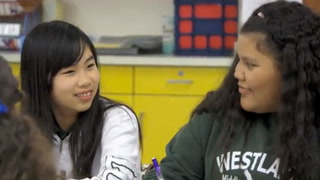
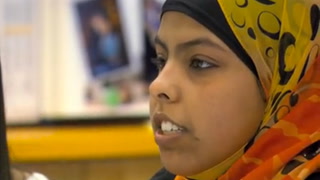
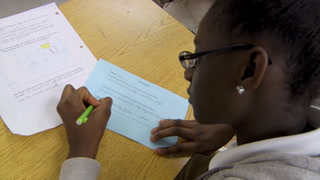
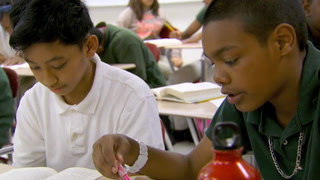
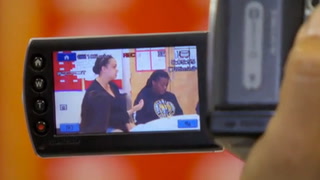
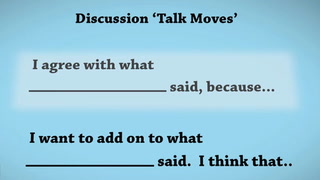
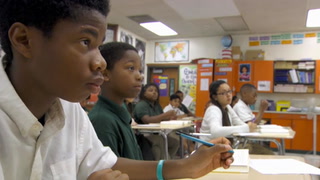









6 Comments
Janet Malunda Feb 20, 2022 4:52pm
Ms. Paraiso eloquently conveys the Socratic Seminar format to her students and she done it successfully.She used shared group discussions on a certain topic and let them share ideas and opinion among their peers. It is helpful to the students because each one of them express freely about what they feel and what they thought. Sharing ideas help them invest a proper instructions. It awakens student interest on the topic. The purpose is to focus on individuality skills and intelligence and also be open to speak up .
Claudia Rivera Feb 1, 2022 12:59am
Wonderful video. https://learn.teachingchannel.com/video/senior-project-reflection-socratic-seminar-ousd
Sandra Towers-Halpin Sep 13, 2021 10:30am
This was so amazing! I feel that ELL and ALL students are benefitting from the scaffolded approach to research and presentation. It is clear that Mrs. P has high expectations for her students and creates the supportive environment necessary for students to reach their potential. She is mindful of providing lots of modeling, clarification, and patience.
My biggest takeaway from this video is what a gift Mrs. P is providing her students...the gift of self-reflection and accepting constructive criticism without taking it personally. The process of looking at all feedback prior to looking at individual feedback was helpful. Being able to accept difficult and/or challenging information about ourselves is a skill we all desperately need!
Craig Rohrbough Mar 16, 2017 1:15am
Judy Mrecieca Mar 6, 2017 8:18pm